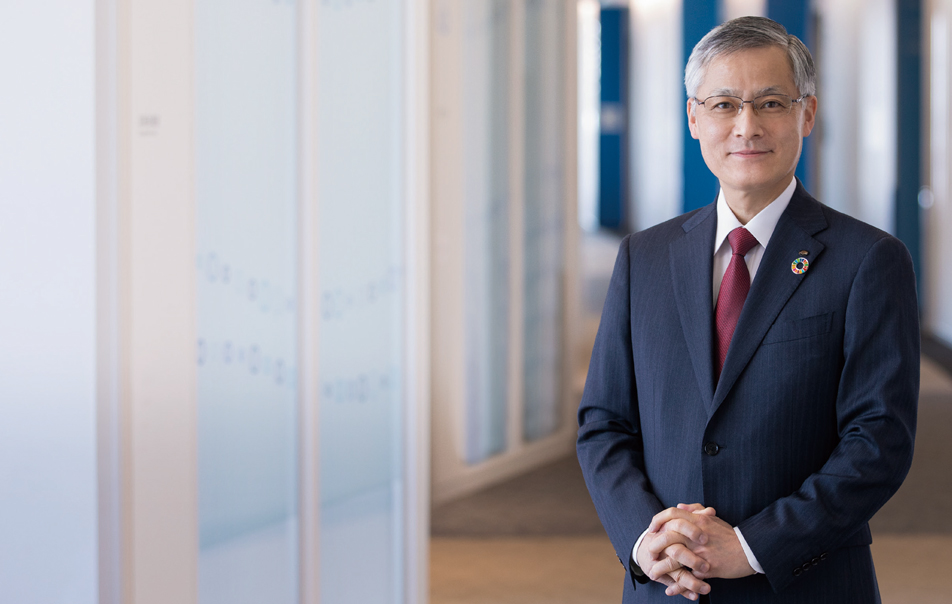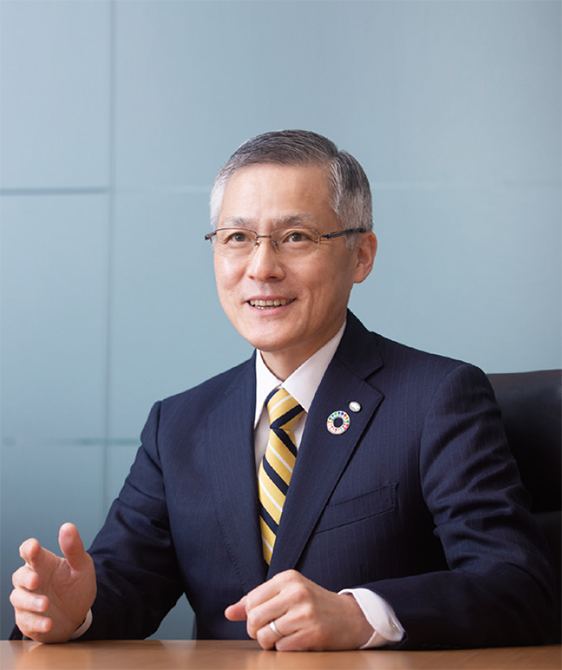Message from the Chief Financial Officer
Create a foundation for the group aimed at achieving new growth focusing on normalized EPS and ROIC to maximize corporate value
Director of the Board, Senior Executive Officer & CFO
Noriya Yokota
Progress under the medium-term business plan
Good progress under the medium-term plan after achieving targets in 2019
-
Could you tell us the main details of the current medium-term business plan?
-
Under the previous medium-term business plan, we were able to accomplish the goals we set for restructuring and revitalizing certain businesses. Our existing businesses are performing well overall, and we are aiming to further improve the profitability of each one. On the other hand, market conditions are becoming more challenging for our beer businesses in Japan and Australia, which form the foundation of the Kirin Group as a whole, and we believe it will be difficult to realize sustainable growth with the Group’s business portfolio as it stands now. Therefore, from a long-term perspective, it will be necessary to cultivate new growth drivers that leverage the Group’s strengths. Under our current medium-term business plan, investment aimed at realizing profit growth in our existing businesses is given priority when allocating cash, including investment in intangible assets as well as capital investment. Our next priority is to pay stable dividends based on a payout ratio of at least 40%. Then we plan to allocate cash for growth investment that can bring about the Group’s expansion in the future. Finally, we will aim to enhance shareholder returns by scaling back low-profit operations and assets that do not contribute to sustainable growth, such as cross-shareholdings that are incommensurate with the cost of equity, while considering share buybacks.
-
What key performance indicators are you using?
-
In the current plan, our key financial performance indicators are normalized earnings per share (EPS) and return on invested capital (ROIC). We are targeting normalized EPS of at least 5% on average annually while striving to boost profits in the Group’s existing businesses, namely Food & Beverages and Pharmaceuticals. We will allocate the cash from that profit growth to growth investment and shareholder returns, but investment will be carried out with discipline as we work to reach our ROIC target of at least 10%. To achieve these financial targets, we will have to improve profits in each business and also step up our balance sheet management.
-
What progress has been made with respect to these targets?
-
In fiscal 2019, both single-year financial targets were achieved. The Group’s existing operating companies, particularly Kirin Brewery, Kirin Beverage, and Kyowa Kirin, also realized profit growth in line with targets. As part of our balance sheet management, we scaled down assets by selling off Lion Dairy and Drinks and reducing cross-shareholdings by around 36 billion yen. Excellent progress was also made with respect to share buybacks.
Looking ahead, we will be implementing comprehensive measures with a view to achieve our 2021 targets. They include initiatives for achieving profit targets in each business, and further reductions of assets that do not contribute to sustainable growth, such as cross-shareholdings. We are aiming to expand the beer business through growth investment. Toward that end, we acquired New Belgium Brewing Company, a craft beer brewer in the United States. In the Health Science business, Kirin Holdings acquired a stake in FANCL Corporation, an important investment for establishing a supply chain in this business. In other words, we have started up and accelerated the development of businesses that will spur growth in the future.
Bolstering the profitability of existing businesses and establishment of the Health Science
Solid results from the domestic and Pharmaceuticals businesses but challenging conditions for Lion and Kyowa Hakko Bio
-
As CFO, how would you evaluate the improvements in earnings from the Group’s existing operating companies?
-
Kirin Brewery and Kirin Beverage, the Group’s two main companies in Japan, both operate in challenging and increasingly unstable market environments, so I am very impressed by their ability to boost profits. Kirin Brewery has increased profits for four consecutive years, and Kirin Beverage has posted profit increases for five years in a row. Both companies have been carrying out marketing campaigns that place importance on gaining returns on investments while implementing internal reforms designed to promote innovation in their organizations.
Kyowa Kirin, which is in charge of the Group’s Pharmaceuticals business, has been dealing with expired patents for mainstay products and unfavorable price revisions under Japan’s drug pricing system. Nevertheless, it has been producing solid results by launching products in the global market, including Crysvita.
Lion has been struggling amid changing market conditions, with competitors engaging in an increasingly fierce price war in Australia. Furthermore, market demand for traditional classic category of beer, which make up most of Lion’s portfolio, has been on the decline. Despite the company’s efforts to strengthen its brands and cut costs, profits were down in fiscal 2019. We will need to closely follow market trends in Australia going forward. Our goal is to improve profitability by developing brands in growing beer category, such as contemporary and craft beer markets, and cutting costs through head office-driven supply chain management.
Financial strategies and governance for maximizing corporate value
-
Could you tell us about Kyowa Hakko Bio’s turnaround plan and its prospects for profitability?
-
Kyowa Hakko Bio is expected to post a loss in fiscal 2020, mainly because it will be preoccupied with verifying manufacturing procedures and starting up production on a sequential basis. Customers have requested the company to resume product deliveries, so it is steadily speeding up the implementation of the turnaround plan. The Kirin Group’s production and quality control capabilities have been refined over many years, and I am confident that they can be integrated at Kyowa Hakko Bio. We expect the Health Science domain to drive the Group’s growth in the future, and Kyowa Hakko Bio has many excellent materials
Balance sheet management
Improving ROIC while scaling back on assets that do not contribute to sustainable growth
-
How do you plan to achieve your balance sheet management targets?
-
We are repaying interest-bearing debt incurred during the previous medium-term business plan. As of December 31, 2019, the gross debt-to-equity ratio was 0.59, a level that allows us to have a flexible approach to financing. We believe this level is suitable for maintaining stable credit ratings and flexible leverage going forward. The weighted average cost of capital was 6%, and we are aiming to exceed our minimum target of 10% for ROIC. In order to continue increasing returns on invested capital, we plan to further reduce assets by disposing Lion’s Dairy and Drinks business and selling off cross-shareholdings, increasing the proportion of business assets with higher capital efficiency, and implementing growth investment that meets our ROIC criteria. Through those measures, we will pursue the targets of our key performance indicators.
-
Can investments up to now, including in FANCL Corporation, generate a return of at least 10%?
-
On its own, the return on investment in FANCL will fall short of 10% over the next five years. From a long-term perspective, however, we view it as a vital strategic investment for creating a business model in the Health Science domain and for establishing a new source of profitability in the future. We are on track to achieving our 10% ROIC target for the Kirin Group as a whole. For all other investment targets, we decide to proceed after confirming that returns of at least 10% are feasible. Our decision-making process takes into account past mergers and acquisitions. We not only confirm whether a potential target meets financial criteria, but also follow a disciplined decision-making process based on a variety of considerations, such as the strength of a company’s brand, the capabilities of its management team, and its profitability. Kirin Holdings followed this process when it acquired a stake in Myanmar Brewery in 2015, and since then, the post-merger integration proceeded smoothly and high rates of growth have been maintained.
Cash allocation
Steady progress made as allocation policies proceed according to the medium-term business plan
-
How has the three-year cash flow plan been progressing?
-
Among cash outflows over the next three years, we forecast capital investment of 310 billion yen, dividend payments of 210 billion yen, and growth investment of about 300 billion yen. Based on the outlook for cash inflows, we plan to flexibly deliver shareholder returns. In fiscal 2019, capital investment came to 96.4 billion yen while dividends paid amounted to 65.2 billion yen. Growth investment has reached about 180 billion yen to date. On the whole, our cash allocation plan, which is included in our medium-term business plan, has been proceeding smoothly. We forecast 700 billion yen in operating cash flow. While the amount was 178.8 billion yen in fiscal 2019, we will continue taking all necessary measures to maximize the Group’s ability to generate cash. Also in fiscal 2019, the sell offs of cross-shareholdings and Lion Dairy and Drinks contributed to cash inflows of around 100 billion yen, and share buybacks of about the same amount were concluded.
-
What is your outlook going forward?
-
We will work to make the Group’s existing businesses more profitable in order to generate operating cash flow in line with our plan. In fiscal 2020, however, we expect progress to be slow due to challenges confronting Lion and Kyowa Hakko Bio. Furthermore, it is currently difficult to predict the impact of the global economic downturn triggered by the new coronavirus pandemic. We will closely monitor the situation and respond accordingly with whatever measures are needed. In fiscal 2021, while our current medium-term business plan will still be in place, we will need to consider the increasingly volatile macro environment and respond appropriately when necessary, such as setting even more explicit investment priorities.
-
How do you intend to raise shareholder returns?
-
Our policy has not changed under the current medium-term business plan. First of all, we will continue adhering to the payout ratio of at least 40% set in 2019. Moreover, while we intend to keep searching for growth investment opportunities, if no opportunities arise or if our investment criteria are not met, we will not move forward with such investment. Instead, we would prefer to conduct more share buybacks at opportune times.
Conclusion
Maximizing corporate value by achieving performance targets
-
Finally, what message would you like to give to shareholders?
-
Looking back, 2019 was a year in which we made excellent progress in implementing the strategies laid out in Kirin Group Vision 2027, our long-term management vision. On the other hand, several challenges arose, particularly disappointing financial results posted by Lion and Kyowa Hakko Bio. Looking ahead, we will need to boost profits in the Food & Beverages and Pharmaceuticals domains, and firmly establish the Health Science business. I believe that accomplishing these tasks is essential. The impact of the new coronavirus pandemic is a cause for concern, but by examining that impact on our businesses and flexibly responding with appropriate actions, the Kirin Group will aim to achieve the performance targets set in our 2019 medium-term business plan. I understand there is concern in capital markets as to whether we will make the right decisions when moving forward with growth investments. To reassure those markets, the Board of Directors is taking steps to strengthen corporate governance, following a disciplined investment decision-making process, and raising its standards for accountability.
PROFILE
Director of the Board, Senior Executive Officer & CFO
Noriya Yokota
Since joining Kirin Beer in 1984, Mr. Yokota has held position as executive officer, general manager of production & quality control department, Kirin Brewery, as executive officer, general manager of personnel & general affairs department of Kirin Company, and as senior executive officer, director of corporate strategy of Kirin Holdings. Mr. Yokota was appointed director of the Board, senior executive officer of Kirin Holdings in 2018.


